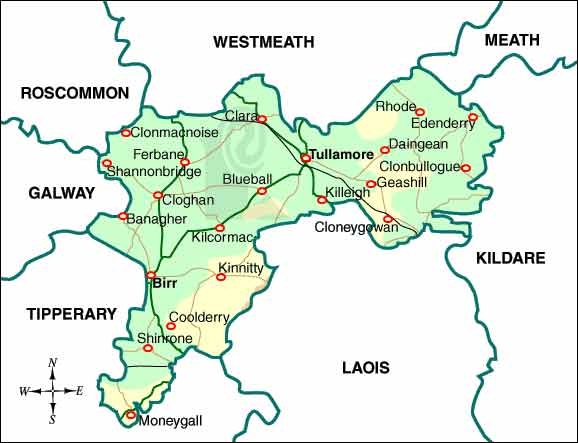Let's Get Ready
 |
 |
 |
||
 |
 |
 |
||
- Published on: 5 June 2020
- Last updated on: 12 April 2025
Our site is packed with information so whether you're a parent, working with children, interested in a childcare career or just browsing, this is the place for you!
Offaly County Childcare Committee is located at a new address: 8 O'Connor Square, Tullamore, Co. Offaly, R35 Y7P0
![]() We have a facebook page. Visit us here
We have a facebook page. Visit us here
Please take a look and remember to give us a like!
The goal of AIM is to create a more inclusive environment in pre-schools, so all children, regardless of ability, can benefit from quality early learning and care. The model achieves this by providing universal supports to pre-school settings, and targeted supports, which focus on the needs of the individual child, without requiring a diagnosis of disability.
AIM commenced in 2016, since then, it has helped tens of thousands of children with a disability to access and meaningfully participate in the ECCE (Early Childhood Care and Education) programme in pre-school settings nationwide. The model has been recognised internationally and has won awards for both excellence in practice, and inclusive policy.
Next page: AIM and ECCE
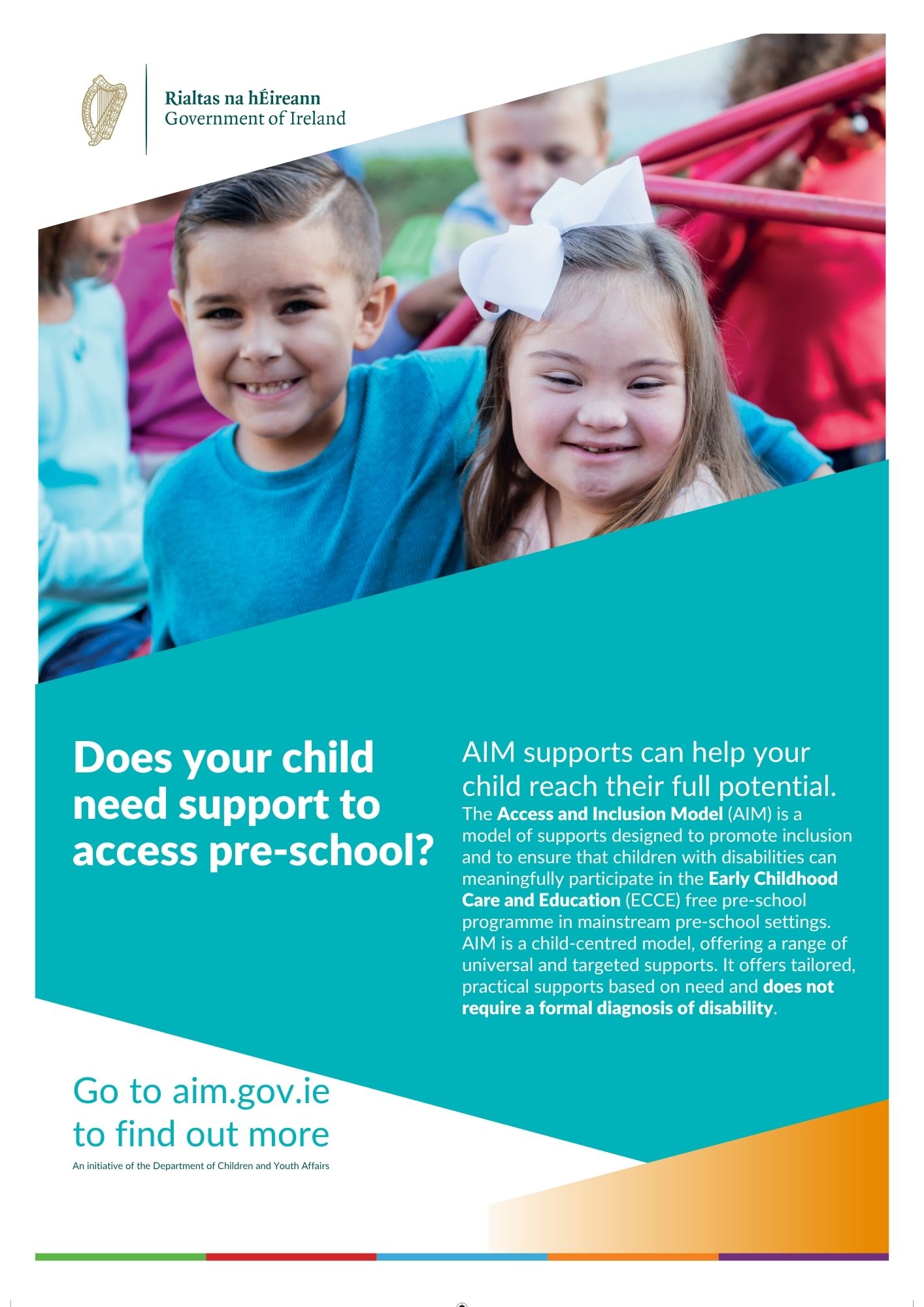
The benefits for children of quality early childhood care and education are well documented.
Under the Early Childhood Care and Education (ECCE) Programme, all eligible children in the Republic of Ireland are entitled to free early childhood care and education (otherwise known as ‘free pre-school’) in the period before they start primary school.
With effect from September 2018, there will only be one intake of children in September each year – increasing all children’s participation on the ECCE programme to two full pre-school years, (please see the ECCE eligibility calendar).
In order to support children with a disability to access free pre-school, a major new programme of supports, the Access and Inclusion Mode (AIM), has been introduced.
Next page: Access and Inclusion Model
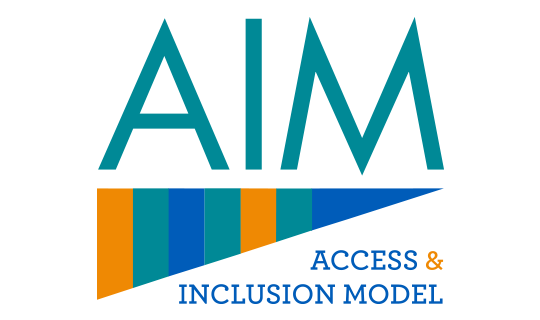
The Access and Inclusion Model (AIM) is a programme of supports designed to ensure that children with disabilities can access the Early Childhood Care and Education Programme in mainstream pre-school settings and can participate fully in the pre-school curriculum alongside their peers.
AIM is a child centred model of supports, involving seven levels of progressive support, moving from the universal to the targeted, based on the needs of the child and the pre-school setting. The model is designed to be responsive to the needs of each individual child in the context of their pre-school setting. It will offer tailored, practical supports based on need and will not require a formal diagnosis of disability.
Levels 1 – 3 of the model involve a suite of universal supports which are designed to promote and support an inclusive culture within pre-school settings by means of a variety of educational and capacity-building initiatives for pre-school providers and practitioners. International evidence suggests that these supports, when appropriately developed, are sufficient to support many children with disabilities.
However, where a pre-school provider, in partnership with a parent, considers that some further additional support may be necessary to meet the needs of a particular child, they can apply for one or more targeted supports under levels 4 – 7 of the model. Additional targeted supports could take the form of expert early childhood care and education advice and mentoring (level 4), specialised equipment, appliances and minor alterations (level 5), therapeutic supports (level 6) and additional capitation to fund extra assistance in the ECCE pre-school room (level 7). More information on these targeted supports is provided below.
Finally, AIM applies to all mainstream pre-school settings which are funded through the ECCE Programme. In addition to mainstream settings, pre-school services are also offered in special pre-schools and early intervention classes which cater exclusively for children with disabilities. While the underlying vision of AIM is to cater for as many children as possible in mainstream settings, it is recognised that a small number of children will continue to need specialised services.
Next Page: Targeted Supports under AIM


You will be able to access AIM supports through your pre-school provider.
If you have not as yet identified a suitable pre-school for your child, information on childcare services may be viewed on Pobal Maps via this link. You can search by facility name or address, or browse to your location to click on the service and access further information. For a video tutorial on how to use this resource please click HERE. If you require any further assistance with using the system, please email This email address is being protected from spambots. You need JavaScript enabled to view it.. Alternatively your local City or County Childcare Committee will be able to assist you – a list of all CCCs can be found here (CCCs).
When you have identified a pre-school for your child, your pre-school provider will, in consultation with you, consider what supports may be needed to ensure your child’s meaningful participation in the ECCE Programme.
Where it is considered that your child needs additional support, your pre-school provider can apply, in partnership with you, for targeted supports under AIM. Applications are made via the Programmes Implementation Platform (PIP) on the Pobal website. Pobal are the current administrators of the ECCE programme. Your pre-school provider will be familiar with the Pobal website and with PIP.
Applications can only be made with your full consent. A copy of the parental consent form can be viewed here [Parental Consent Form]. This form should be printed and signed by the parent and should then be uploaded and submitted with the completed application. In providing consent for an application to be made, you are also providing consent for information on your application to be shared with relevant professionals involved in processing the application and providing supports under AIM (eg. Early Years Specialist, HSE occupational therapist, Pobal officials etc.).
Where an application for supports has been made, Pobal will process the application and will inform both the parent and the pre-school provider of the decision reached. Where a parent, in partnership with a pre-school provider, is unhappy with the decision reached by Pobal, they can seek a review. More detail in relation to the process of decision making is available here under AIM rules 2022/2023.
The AIM policy places the child at the centre and recognises the important role of the parent in all decision-making concerning access and participation.
All pre-school providers and staff should be familiar with the AIM Policy & Rules. Pre-school services that avail of AIM are obliged to comply with these rules. They are a useful resource for both parents and for the early learning and care sector.
Compliance checks will be included for the Access and Inclusion Model in 2024 to confirm adherence with programme rules. Further information on these checks are included in this rule document.
| AIM Policy & Rules 2024/2025 (PDF) |
The National Childcare Scheme (NCS)
What is the National Childcare Scheme?
The National Childcare Scheme provides subsidies to help parents meet the cost of quality Early Learning and Care and School Age Childcare. It will replace all previous targeted childcare support programmes with a single, streamlined and user friendly Scheme.
Under the National Childcare Scheme, subsidies are available for families with children aged between 24 weeks and 15 years who are attending any participating Tusla registered childcare service, including any Tusla registered childminder and school age childcare services.
There are two types of subsidies under the National Childcare Scheme:
For more information on Universal and Income Assessed subsidies click here.
Click to view National Childcare Scheme Information Leaflet and Frequently Asked Questions click.
How to Apply
To apply for the Scheme online you will need to have a verified MyGovID.
Your verified MyGovID is your single, secure account to unlock Irish Government services online. Click here to set up your verified MyGovID before you apply.
For further information relating to the National Childcare Scheme please visit https://ncs.gov.ie/home
| Information Booklet for Parents | Information Booklet for Providers | Subsidy Calculator |
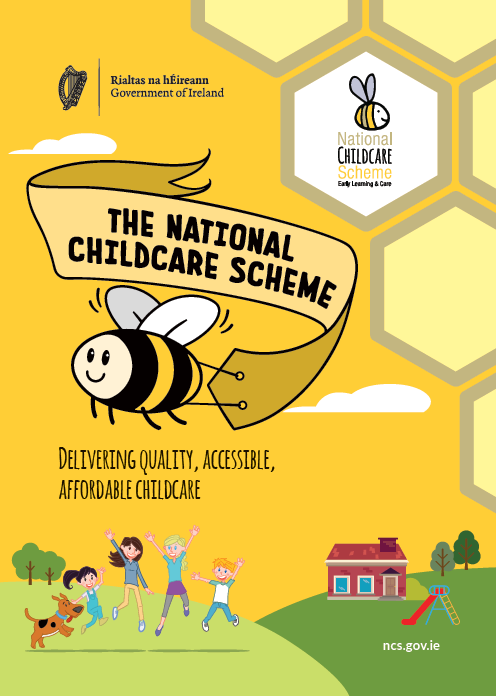 |
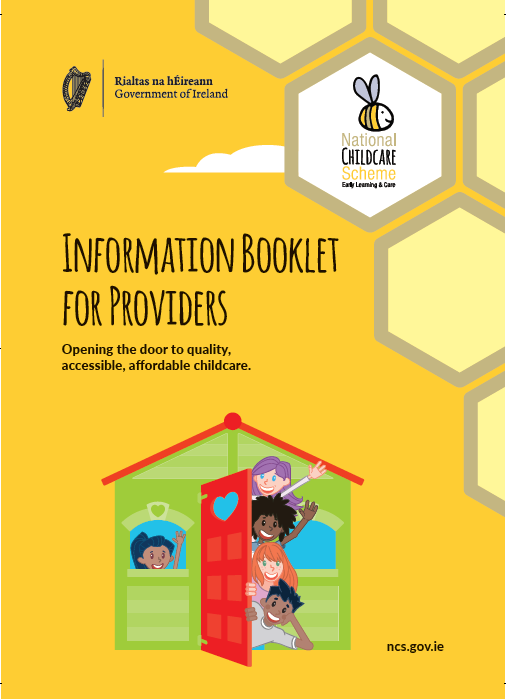 |
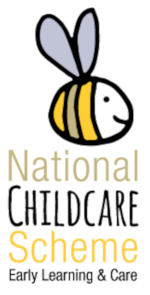 |
There is a very significant body of evidence that the early years matter. Some key points are:
In brief, development in the early years is a key determinant of the child's future learning capacity, the ability to choose right from wrong, the ability to interact with others, the ability to develop trust and respect for other people. The evidence provides unequivocal support for the economic benefit of investment in early childhood and shows that the benefit accrues not only to the individual child and family, but to all citizens. Early childhood services provide essential support for children's cognitive, social and emotional development: they also enable parents to participate in the workforce and they provide valuable employment for skilled workers. In addition to these universal benefits, evidence demonstrates that more intensive and targeted early childhood services have the potential to significantly enhance the life chances of more vulnerable children.
In recognition of the above, State investment in early childhood care and education has been a key focus of recent years, and despite economic difficulties, every effort has been made to maintain a high level of investment.
State Investment
Prior to 2000, there was very limited capacity in the childcare sector. However, over the decade 2000 to 2010, the State, initially in partnership with the EU, invested €425 million capital funding to create childcare places throughout Ireland. About 65,000 extra places were created. Due to this investment Ireland has a good infrastructure for childcare which can provide the basis for quality services that meet the needs of children and families.
On behalf of the Childcare Directorate of the Department of Children Equality Diversity Inclusion and Youth (DCEDIY) the County Childcare Committees (CCC’s) administer the main childcare funding programmes that subsidise fees for parents in early year’s services locally. There are two key government funded childcare programmes as follows:-
Offaly County Childcare Committee support the development of quality, affordable, inclusive, accessible childcare and family friendly services for all children in every part of the county.
Offaly County Childcare Committee has been meeting since May 2001 and is made up of representatives from the statutory sector, social partners, community groups, voluntary groups, the Community and Voluntary Forum, National Voluntary Children's Organisations, providers of childcare, and parents - all of whom have a vested interest in childcare provision in the county.
